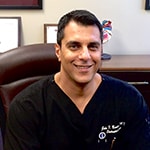What is an ECG?
An electrocardiogram, often abbreviated as ECG or EKG, is a test to measure the electrical activity of the heartbeat, timing the electrical impulse and measuring its strength. An electrical impulse, or wave, is sent through the heart to signal each beat. The upper chambers, consisting of the right and left atria, are responsible for making the first wave known as the “P wave.” The impulse then travels to the bottom chambers, the ventricles, making the “QRS complex” wave. The ventricles then return to a resting state, which is represented by the final “T wave.” These waves are timed with the ECG, represented by a traveling line. A normal ECG will show consistent timing of the upper and lower chambers.
Why is an ECG Done?
An ECG is used to measure the time it takes for the electrical wave to travel through the heart, as well as how strong the electrical activity is. By measuring the amount of time it takes for the signal to travel between each area of the heart, Dr. Beshai can determine if the heartbeat is normal, too slow, too fast, or irregular. By measuring the strength of the electrical activity within the heart, Dr. Beshai can also determine which area of the heart is working too hard, which is often key to diagnosing certain heart conditions.
When is an ECG Needed?
An ECG can be used to detect an irregular heartbeat or arrhythmia. It can also detect a blocked or narrowed artery in the heart or a structural problem with the heart’s chambers. An ECG may be recommended if you experience the following symptoms:
- Heart palpitations
- Rapid heartbeat
- Chest pain
- Shortness of breath
- Dizziness
- Weakness
- Fatigue
An ECG may also be recommended if you have a personal or family history of heart problems, including heart attack. The ECG can detect early signs of heart conditions, even before you begin showing symptoms.
Have Inquiries About Our Services?
How is an ECG Performed?
An ECG is completely painless and noninvasive. During the test, several sensors will be placed over the chest and sometimes the limbs to detect the electrical activity of the heart. An ECG only measures the electrical activity of the heart and does not send electricity into the body, making it safe and risk-free. The ECG can detect information from 12 different areas of the heart, displaying the electrical activity as waves on a graph. Your ECG can take about 10 minutes to attach the sensors, or electrodes, but the actual recording of the heart rhythm takes just a few seconds.
What are the Next Steps After an ECG?
Dr. Beshai will discuss your results of the ECG the same day as your test, or at a follow-up appointment. If the ECG is performed for preventative reasons and everything comes back normal, you may not need further testing. However, if an irregularity is detected, Dr. Beshai may recommend further heart monitoring or testing.
Holter Monitor
For irregularities that come and go, this may not be detected during the short time an ECG is being done. In this case, a holter monitor may be needed. A Holter monitor is a small wearable device that records a continuous ECG over the course of 24-48 hours.
Stress Test
If your symptoms occur during exercise, Dr. Beshai may recommend a stress test. During a stress test, you will be asked to walk on a treadmill or ride a stationary bike during an ECG to monitor your heart rhythm.
Schedule Your ECG Consultation
Dr. Beshai uses the ECG as an important diagnostic test that can detect abnormalities in the heart rhythm and where they’re coming from. When it comes to the heart, early screening, and monitoring are essential, even if symptoms have not occurred yet. If you think you could benefit from an ECG, contact our office to meet with Dr. Beshai, an experienced cardiac electrophysiologist, at the Heart Rhythm Institute of Arizona by calling our office or filling out our online form.
The Heart Institute of Arizona has a wide array of services that come with our premium care. From in-office dianostics and treatable conditions, to hospital based procedures, we’ve got your heart covered.
Dr. Beshai is a board-certified electrophysiologist internationally renowned and respected for his expertise and research. Having published in major medical journals and travelled all over the world to present research, he is dedicated to providing innovative, state-of-the-art care to his patients.

